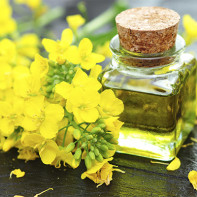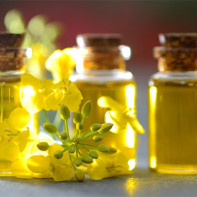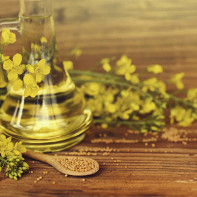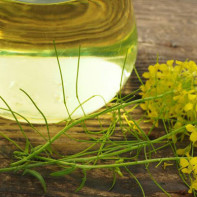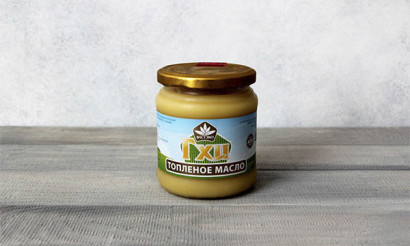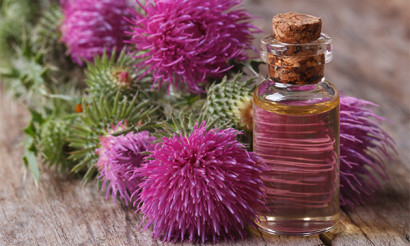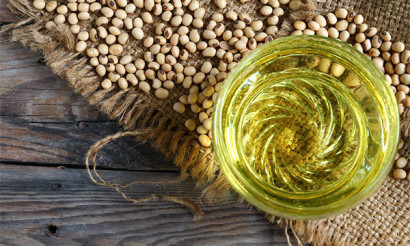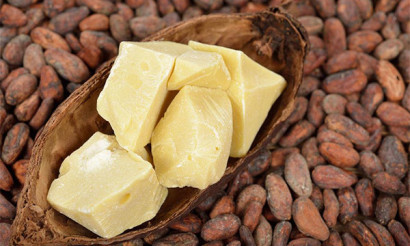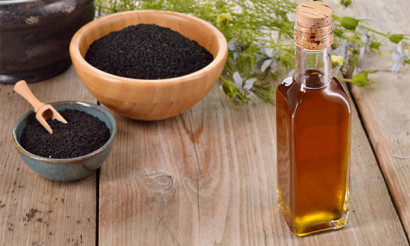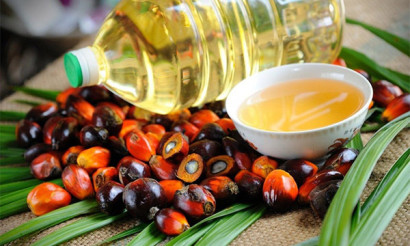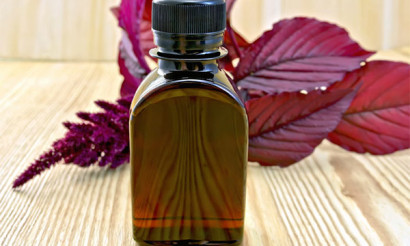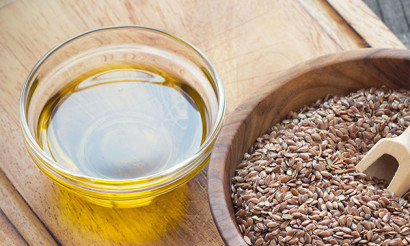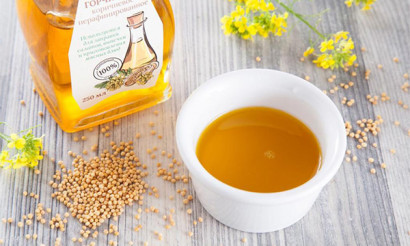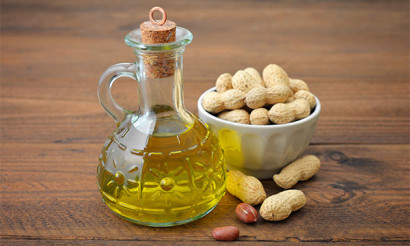Rapeseed oil: useful properties and contraindications
Rapeseed oil is a type of vegetable fat produced on an industrial scale. It is obtained from the seeds of a plant called rape. For a long time, rapeseed oil was considered to have harmful properties, so it was used only in the technical sphere. It was used as a lubricant or fuel for lamps.
- What rapeseed oil is made of
- Types
- Composition and calories
- Useful properties of rapeseed oil
- General benefits
- For Women
- For Men
- In Pregnancy
- Breastfeeding
- For children
- For weight loss
- The benefits and harms of rapeseed oil in baby food
- Useful properties
- Harmful properties
- Medical Usage
- Cooking
- Salad "Good friend".
- Granola
- Chinese cabbage pancakes
- Can I Fry in Rapeseed Oil?
- Rapeseed oil in cosmetology
- For Face
- For Hair
- Hazards and Contraindications
- How to choose and store
- Interesting facts about rapeseed
Today, the scope of technical application of the oil presented significantly expanded, it is used to prepare soap, it is used in both textile and leather industries, it serves as the basis for the manufacture of olive oil and diluents for oil paints. In addition, rapeseed oil is used in metallurgy as well as in the chemical industry.
The gastronomic properties and valuable chemical composition of this product have caused its use in cooking, and its production is increasing every year. Rapeseed oil is most widely used in the food markets in America, as well as in Europe. In Canada, production of this oilseed crop exceeds all alternatives.
What rapeseed oil is made from
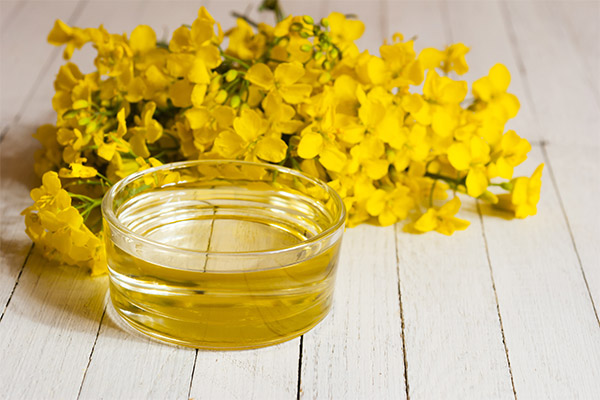
Rapeseed oil is pressed from the seeds of a cruciferous crop called rapeseed. It is an annual herbaceous plant related to cabbage. The first mention of this crop dates back to over 4,000 B.C. on the Mediterranean coast. The plant blooms with large flowers that have a lot of nectar, which allows for seasonal harvesting of rapeseed honey. Rapeseed oil technology involves pressing the seeds or extracting them.
Types
The level of quality and the methods used in processing determine the type of rapeseed oil, of which there are only two. They are either refined or unrefined (or unrefined). In the production of these products the mass fraction of erucic acid, which must not exceed 5%, is subject to mandatory control. In this case, rapeseed oil is considered a completely safe food product, not capable of causing harm to human health.
Composition and calories
Rapeseed oil is characterized by a balanced content of fatty acids and, unlike others, is characterized by the smallest amount of them in the composition. The percentage of fatty acids is as follows:
- unsaturated - 66%;
- saturated, 6%;
- Polyunsaturated - 27%.
In addition, rapeseed oil contains vitamin E and a group of carotenoids. The content of dangerous erucic acid is successfully reduced by modern technology to 1% of the total composition to obtain the name - nil-rapeseed or to 0.1% to obtain the name - double nil-rapeseed. The percentage of the remaining fatty acids is represented by the following list:
- myristic - 0.2;
- palmitic - 2.5;
- palmitoleic - 0.6;
- stearic - 3;
- oleic - 51;
- linoleic - 15;
- linolenic - 5;
- arachic - 0.2
- gondione - 0.1
- eicosadienoic - 0.1
- Begene, 0.6;
- docosadienoic - 0.1;
- lignocerin - 0.3;
- selacholic - 0.4,
The energy value of the product is measured by 899 kilocalories contained in each 100 g of weight. It is composed of 0.1% water and 99.9% fat. In addition, 100 g of this oil contains 18.9 mg of vitamin E and 2 mg of phosphorus.
The useful properties of rapeseed oil
General benefits
The diverse composition of fatty acids and a wide list of useful properties have led to rapeseed oil being nicknamed the northern olive oil and becoming widespread. It is a rich source of fats for the body, which serve not only as structural material for the formation of cells, but also as an energy component.
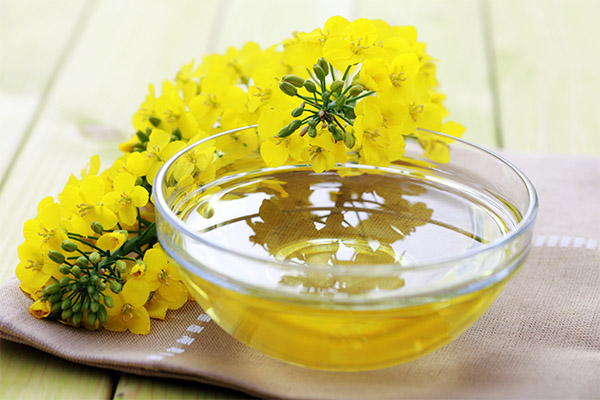
In addition, fats help create a protective barrier, which protects against both mechanical damage and overcooling of various organs, and also prevents dehydration of tissues. In addition, fats are necessary for the normal functioning of the immune and cardiovascular systems and take part in reproductive function.
Oleic acid contained in rapeseed oil belongs to the monounsaturated group and takes an active part in cholesterol metabolism. Linoleic and linolenic acids are not produced by the human body, but they are necessary as a material that forms cell membranes and improves the plasticity of blood vessels.
The useful properties of rapeseed oil can be represented as the following list:
- takes part in cholesterol metabolism, which reduces the risk of atherosclerosis;
- increases the elasticity of blood vessels, reducing the likelihood of blood clots;
- stimulates the immune system at the cellular level;
- prevents the development of osteoporosis;
- increases brain activity;
- Improves the sensitivity of the optic nerve;
- differs bactericidal action;
- reduces the activity of inflammatory processes;
- increases the rate of regeneration processes;
- stimulates the synthesis of hormones that can suppress appetite;
- increases the rate of metabolism;
- activates metabolism, preventing fat deposits in the liver;
- takes part in protein synthesis;
- Tones muscle tissues and improves skin elasticity;
- fights oxidation processes, slowing down tissue aging;
- prevents the formation of tumors.
Oleic acid, a part of rapeseed oil, is resistant to heating, which eliminates the appearance of harmful carcinogens. This allows the product to be used when frying various dishes.
For women
Experts have found that rapeseed oil contains an element identical to the female hormone that actively opposes cancer cells. The sex hormone estradiol is produced in the female body at the beginning of the menstrual cycle when the egg leaves the ovary and is responsible for normal reproductive function. During this period, a woman's skin is particularly elastic and there is a shine in the eyes. A San Francisco study conducted in the second half of 2008 found that women who used rapeseed oil were less likely to get breast cancer.
For men
It turns out that for the male body, rapeseed oil is a rather controversial product. Its many beneficial qualities, such as its ability to strengthen blood vessels, lower cholesterol, increase brain activity and eliminate blood clots, help to strengthen the body overall. However, the high content of female hormone in the composition of the oil can cause negative consequences.
The mentioned circumstance can shake the hormonal balance, which will definitely weaken the male health. The result of such action will be a weakening of potency and a decrease in the quality composition of the seminal fluid. For this reason, men are advised to refrain from systematic consumption of this product, because the risk of diminished sexual function is a very serious argument.
When pregnant
Pregnant women are advised to pay special attention to the useful properties of rapeseed oil. Fatty acids are of great value, participating in the processes of formation of the brain structure of the developing fetus. In addition, the composition of the presented oil reduces the likelihood of premature birth. Plus, expectant mothers need vitamins A and E, which provide a stable hormonal balance and are contained in rapeseed oil. This product is on the lists of recommended foods during pregnancy.
Breastfeeding
During breastfeeding, breastfeeding mothers are recommended to consume 1 tbsp of rapeseed oil per day. The product helps to enrich breast milk with useful elements, providing the infant's body with easily digestible energy. In addition, the chemical composition of rapeseed oil provides the necessary substances for the formation of a fast-growing brain.
For kids
Rapeseed is a crop that was artificially bred by crossing cabbage and madder. Therefore, it is considered a genetically modified product, the use of which is not recommended by many experts. This is the reason for the negative attitude towards rapeseed oil, especially in children's diets. But the whole secret is that the harmfulness of this product consists in the high content of erucic acid, which is poorly excreted from the body and can accumulate there.
However, thanks to the development of genetic engineers, new varieties have been developed in which the content of the harmful component has been reduced by an order of magnitude. This new quality made it possible to use rapeseed oil in the food industry, eliminating the danger of using it even in children's diets.
When losing weight
One of the useful qualities of rapeseed oil is the normalization of metabolism in the body. In addition, this product lowers cholesterol and promotes the removal of toxins from the body, which is very useful in the process of losing weight. Among other things, rapeseed oil is highly digestible, which makes its presence desirable in many diets. The ability to neutralize toxins makes the product an indispensable helper for food poisoning.
The benefits and harms of rapeseed oil in children's diets
The permissibility of using rapeseed oil in baby food is a hotly debated topic in scientific circles. However, when buying mixtures in baby food departments, in the composition presented on the package, you can often find the presence of this product. Experts have not yet come to a definite conclusion on this issue, so it is worth considering the characteristics of rapeseed oil in detail.
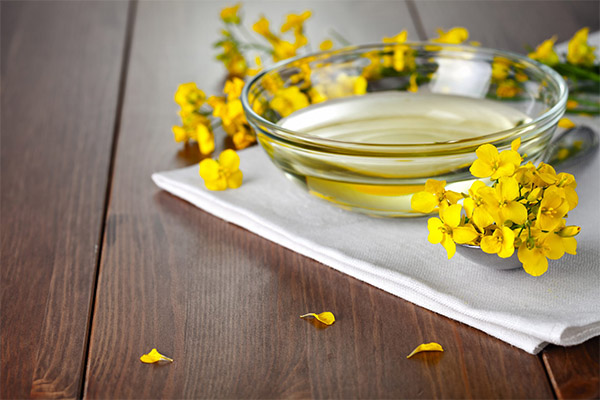
Useful properties
Rapeseed oil is characterized by a high content of alpha-linolic acid. Compared with other vegetable fats, this element has useful qualities for both adults and children. Its percentage is measured at 11%, 3% higher than that of soybean oil. Meanwhile, this acid increases the rate of metabolism, stimulates the regeneration of the skin and increases its elasticity. In addition, alpha-linoleic acid has a strengthening effect for children's immune system, lowers cholesterol and prevents the development of inflammatory processes.
Plus, rapeseed oil contains some fatty acids that can be found exclusively in breast milk, which makes this product unique for baby food. Also among the useful qualities are the content of vitamins A, D and E, which are essential for the developing body.
Vitamin A promotes bone growth and improves eyesight, D serves as a preventive agent against such a disease as rickets, promoting proper bone structure and proportional skeletal development. Vitamin E is essential for healthy nail and hair composition and also develops the contractile reflex in muscles. In addition, rapeseed oil is highly digestible, which distinguishes it from other vegetable fats.
Harmful qualities
The harm of rapeseed oil is due to the content of erucic acid, which has been proven in the past. For this reason, rapeseed oil was not allowed in children's food until a certain time. The said acid is very slowly digested, which contributes to its accumulation in the body. This element has a negative effect on the child's urogenital system, which can affect the subsequent development of sexual function.
In addition, erucic acid slows down growth processes, which can slow down the stages of development of the child's body, has a negative effect on the heart muscle, filling tissues with fatty layers instead of binding fibers. Over time, the effects of erucic acid on the human body have been studied in great detail. As a result of studies, experts from around the world agreed that a content not exceeding 3.1% of the total acid composition can be considered harmless to the body.
Plus, rapeseed oil, before entering the product group, undergoes a procedure of chemical treatment to cleanse it of harmful components. These can be refining or dehumidification processes, which are carried out using hexane at high temperatures.
The use of hexane, the vapors of which have a narcotic effect, in the purification technology does not contribute to the popularization of this oil in baby food. However, if the selected baby formula contains rapeseed oil, you can check the manufacturer's website to see how it is purified. Cold-pressing does not involve the use of questionable chemical constituents.
It is worth remembering that rapeseed oil can provoke allergic reactions, especially in children prone to such disorders. In this case, parents need to monitor the reaction of the child's body, and if there is an undesirable effect, exclude the causative agent from the diet. In addition, meals with rapeseed oil are not recommended to include in the diet of children under one year of age, especially if they suffer from intestinal disorders or chronic diarrhea. Individual intolerance to this product is also possible.
Medical Usage
The useful qualities of rapeseed oil have also found their application in medicine, where it is used as an additional component in various preparations. The product is widely used in the recipes of folk medicine, healing a number of ailments and contributing to the overall strengthening of the body:
- To improve the immune system, it is recommended to take 3-4 tsp. of oil in the morning on an empty stomach.
- To neutralize joint pain, a special compress is used - heated oil is soaked in flannel and applied for 2 hours to the sore area, wrapped in plastic wrap.
- To relieve inflammation, with burns and abrasions injured areas are smeared with rapeseed oil, repeating the procedure several times a day.
Rapeseed oil is also used in a composition that can replenish strength in the body. To do this, prepare a special composition with which to take a bath. Such a procedure is very useful after strong physical exertion. The therapeutic composition includes 50 g of sea salt, 2 tbsp. rapeseed oil, 1 cup of milk, 2 tsp. starch and 6-7 drops of lavender oil. The resulting mixture is dissolved in a bath of warm water, taking 20 minutes.
Use in cooking
Among other things, rapeseed oil is widely used in cooking, where it is used not only to prepare various dishes, but also included in the composition of various seasonings, and also used as the basis for making spreads and margarines. There are a large number of recipes where it is used for hot dishes such as soups, meat and fish products, it is also suitable for baking and sweet desserts.
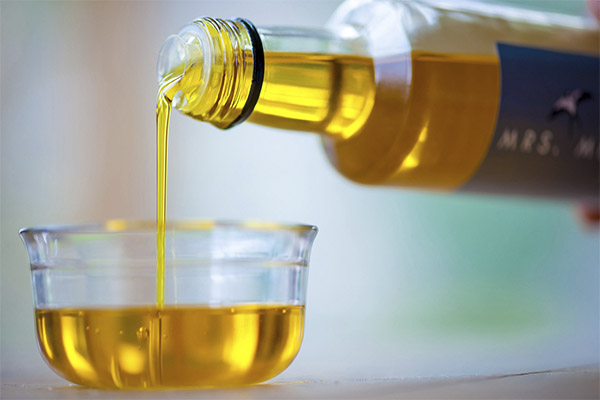
Rapeseed oil is used in many sauces or marinades and as a salad dressing. In addition this oil is used to make mayonnaise and a number of types of margarine. To get an idea of the culinary possibilities of the product it is recommended to consider several recipes popular in different countries of the world.
Salad "Good friend"
To prepare a salad according to this recipe, the following basic components are needed:
- lettuce - 2 bundles;
- papaya or mango - 1 pc;
- pecans - 0,5 cup;
- Piraeus bulgarit cheese - 250 g.
Ingredients for the sauce:
- rapeseed oil - 3 tbsp;
- wine vinegar - 1 tbsp;
- lemon juice - 1 tbsp;
- orange juice - 1 tbsp;
- honey - 1 tsp;
- mustard - 1 tsp;
- salt and black pepper to taste.
Peel the fruit of the papaya or mango, then cut into large cubes about 2 centimeters in size. Coarsely grate the prepared cheese. Tear the washed lettuce leaves with your hands into large pieces. Next, combine the chopped components in a common bowl with nuts and mix. After that, mix all the ingredients prepared for the sauce, whisk well and dress the salad.
Granola
To prepare the dish according to this recipe, prepare the following components:
- peanut butter - 4 tbsp;
- rapeseed oil - 2 tbsp;
- maple syrup - 4 tbsp;
- oat flakes - 1 cup.
Combine all the prepared ingredients, except the oat flakes, in a common saucepan and place over low heat until the peanut butter is flowing. After that, add the oat flakes and mix thoroughly. Put the prepared composition in an oven, preheated to 150 degrees, and bake for half an hour.
Chinese cabbage pancakes
Ingredients:
- Peking cabbage - 0.5 kg;
- dried red pepper in pods - 50 g;
- allspice - 15 peas;
- sesame oil - 10 g;
- rapeseed oil - 10 gr;
- salt - 0.25 tsp;
- soy sauce - 5 gr;
- vinegar - 2 gr;
- sugar - 5 gr;
- monosodium glutamate.
Wash the cabbage leaves separated from the cabbage. In a frying pan, heat the rapeseed oil and add the allspice and red pepper, which should be lightly fried. Next, put cabbage leaves, salt them, pour soy sauce and stew until they become soft. After that, the leaves are drizzled with vinegar and put on a plate to cool. Roasted peppers are cut into small julienne strips, put in equal portions on the cabbage leaves and rolled into rolls. Finished tubes are cut into components, 4 cm long, and laid on a plate. At the end, remove the allspice from the pan, and add sesame oil and monosodium glutamate, mix thoroughly. The finished filling is poured over the lined pancakes.
Can I fry pancakes with rapeseed oil?
Rapeseed oil is high in both monounsaturated and polyunsaturated fats. With a low concentration of saturated fats and a high smoke point, this oil becomes an attractive frying medium. However, it should be borne in mind that oil subjected to heat treatment during the purification process loses most of its useful properties and loses its attractiveness. For frying, it is recommended to use only species obtained by cold pressing.
Rapeseed oil in cosmetology
Rapeseed oil is an excellent remedy for facial skin and hair care, it is especially useful to use masks with this component during the winter period. At this time, the face is exposed to the cold wind and frost, which significantly increases skin irritability. In addition, the face skin is negatively affected by limited exposure to the sun and the use of artificial heating. Masks containing rapeseed oil, perfectly nourish the dermis and serve as a protective agent against external irritants.
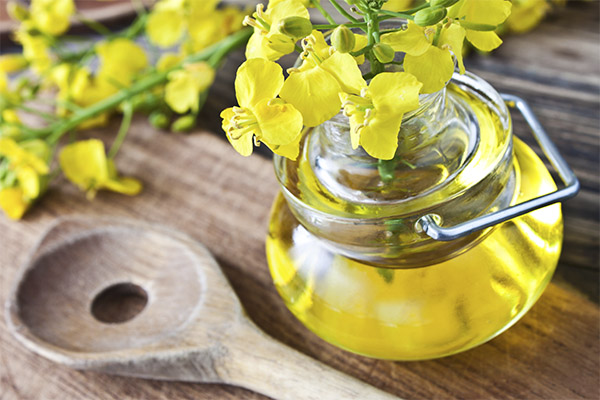
For face
For facial care, it is necessary to choose a mask that best suits your specific skin type. You should also take into account the problem that you need to get rid of, because the composition of each mask is created to solve a specific problem.
Against wrinkles
To prepare this composition it is necessary to prepare;
- rapeseed oil - 1 tbsp;
- Santal oil - 1 drop;
- rose oil - 1 drop;
- Peppermint oil - 1 drop.
The prophylactic composition is prepared quite simply. To do this, all the prepared components are thoroughly mixed and massaging movements rubbed into the skin. The composition is left until completely absorbed. To get the desired effect, it is recommended to carry out the procedure twice a day, in the morning and in the evening.
Against acne
To prepare a composition according to this recipe, it is necessary to prepare:
- rapeseed oil - 1 tbsp;
- Lavender oil - 2 drops;
- Clove oil - 2 drops.
This composition can also be easily prepared by mixing the ingredients. It is applied every morning to well-cleaned skin, soak for 20 minutes until completely absorbed.
For dry skin
To prepare a nourishing mask you need to prepare:
- rapeseed oil - 1 tbsp;
- Melissa oil - 2 drops;
- rose oil - 2 drops;
- Limete oil - 2 drops.
Prepared ingredients are thoroughly mixed until homogeneous and applied to the face until completely absorbed. With dry skin, a nourishing mask, prepared according to this recipe, it is recommended to apply three times during the day.
For hair
For hair care, it is recommended to use a special shampoo made with rapeseed oil. It is necessary to prepare:
- rapeseed oil - 10 ml;
- Shampoo - 100 ml.
To prepare a preventive composition, add rapeseed oil to the shampoo and mix gently. Soap the head with the resulting remedy and soak for 2-3 minutes and then rinse. This composition is an excellent remedy that eliminates both hair breakage and split ends. It is able to give the curls a natural shine.
Harms and contraindications
The greatest danger to the body in the composition of rapeseed oil is erucic acid. The thing is that the human body does not produce the necessary enzymes that can break down this element. As a consequence, this acid is poorly excreted and can accumulate in various tissues, creating an obstacle to the normal operation of internal organs.
The action of erucic acid is especially dangerous for children, because it can impede their development. Accumulated in children element inhibits growth, slows down the formation of skeleton and muscle tissues, interferes with sexual development. For adults, an excess of erucic acid can lead to the formation of fatty deposits around the heart muscle, which leads to heart malfunctions. No less dangerous are fat deposits in the tissues of the liver and kidneys, which can cause a number of diseases.
Still, there are few serious concerns about it. After all, the food industry uses rapeseed varieties that have undergone selection. As a result of this action, the content of harmful acid in the composition of rapeseeds is reduced to an acceptable level.
How to choose and store
First of all, rapeseed oil should be selected by its appearance. A quality product should be transparent. Depending on the method of purification, the oil will have either a light yellow or dark yellow color shade. It is important to monitor the presence of sediment, the presence of which is unacceptable. If the oil is cold-pressed, it may be slightly cloudy.
At home this oil should be stored in a cool, dry room. The relative humidity of storage should not exceed 85%. It is also necessary to limit the oil from contact with direct sunlight for proper long-term storage. When openly packaged, rapeseed oil may have a shelf life of 6 to 12 months, while in its sealed form it can retain its properties for up to 5 years.
Interesting facts about rapeseed
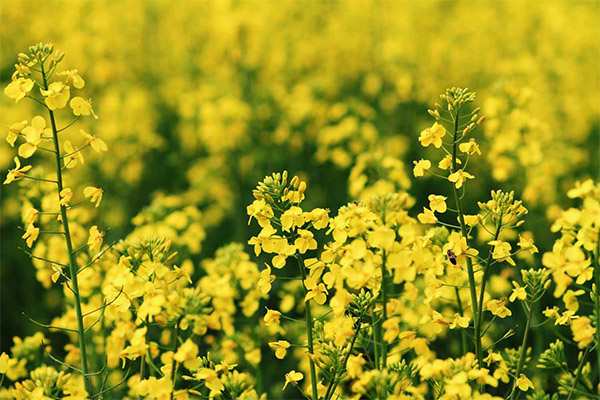
- Rapeseed serves as a rich source of relatively inexpensive vegetable oil. It is also used to make high-protein feeds that are very useful for pets.
- The value of rapeseed is not only in its useful properties. The culture is able to improve the sanitary condition of the fields, because it leaves the field early, improves the overall soil structure, increases the phytosanitary composition, prevents the development of weeds, reducing the weed infestation of the fields. These circumstances contribute to a subsequent increase in grain crop yields.
- Rapeseed does not occur in the wild. This crop was artificially bred as a result of crossing vegetable cabbage and winter or spring rapeseed.
«Important: All information on this site is provided for informational purposes only for information purposes only. Please consult a health care professional before using any of the information on this or any of the recommendations. specialist before you use any of the recommendations. Neither the editors nor the authors shall be liable for any possible harm caused by materials."

